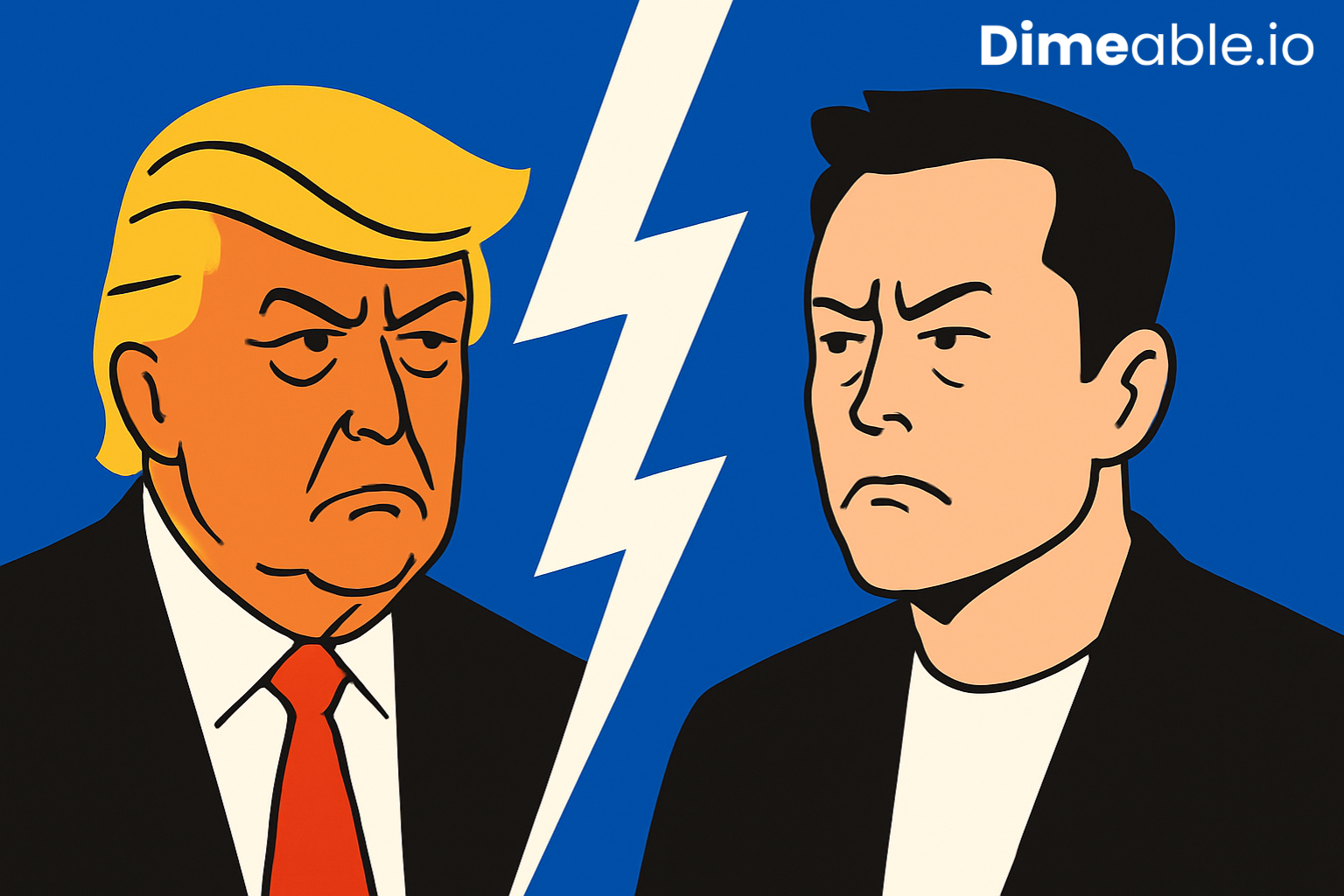In a dramatic turn of events that has captivated both Wall Street and Washington, the once-powerful alliance between former President Donald Trump and tech billionaire Elon Musk has erupted into a public feud. What began as a seemingly productive relationship has spiraled into an all-out clash of egos, ideologies, and influence—one with far-reaching consequences for the future of American politics, business, and innovation.
From Strategic Partners to Fierce Rivals
The Rise of the Trump-Musk Alliance
Trump and Musk’s relationship initially appeared mutually beneficial. Trump gained a respected innovator’s endorsement, while Musk secured influence in policymaking, including a prominent role as head of the Department of Government Efficiency (DOGE). Their collaboration symbolized a rare blend of political conservatism and technological futurism.
Early Warning Signs
Their cordial relationship began to fray during a public farewell event at the White House. While both men exchanged glowing compliments, behind the scenes, disagreements over fiscal policy and government spending had already begun brewing.
The Breaking Point: Budget Bill Showdown
The final fracture came with Trump’s controversial congressional budget proposal. Musk, voicing his concerns on X (formerly Twitter), called the bill a “disgusting abomination” and slammed it for expanding the federal deficit. In a sharp critique, he posted: “A bill can be big or beautiful, but not both.”
Trump responded with increasing hostility, first through official statements, then more aggressively via his platform, Truth Social. He accused Musk of ungratefulness and threatened to revoke billions in government subsidies linked to Tesla and SpaceX.
Public Meltdown: Accusations and Fallout
Musk Fires Back
Musk didn’t hold back. In a series of biting posts, he criticized Trump’s leadership and took credit for key Republican victories, stating, “Without me, Trump would’ve lost. The GOP owes me more than they know.”
The Epstein Controversy
Musk escalated tensions by claiming Trump was mentioned in confidential Jeffrey Epstein files—an accusation that, while lacking concrete evidence, reignited public interest in the long-suppressed case. Musk’s post read: “Trump is in the Epstein files. That’s why they haven’t been released. Enjoy the show, DJT.”
Endorsing Impeachment
In a jaw-dropping move, Musk publicly agreed with calls for Trump’s impeachment, replying “Yes” to a post suggesting J.D. Vance replace the former president. The endorsement marked a complete rupture in their alliance.
Market Shock: A $152 Billion Blow
Tesla’s Record-Breaking Drop
Amid the chaos, Tesla shares dropped 14% in a single trading day—wiping out over $152 billion in market value. It marked the company’s worst one-day loss and illustrated just how sensitive markets are to political and tech-sector volatility.
Market-Wide Impacts
The fallout affected more than just Tesla. Clean energy and EV stocks plunged, while oil, defense, and industrial stocks surged—a classic example of the “Trump trade.” High-frequency trading algorithms amplified the volatility, reacting instantly to keyword-triggered headlines.
Musk’s Strategic Counterattack
In response to Trump’s threat to cancel government contracts, Musk dramatically announced the decommissioning of SpaceX’s Dragon spacecraft. This high-risk move signaled that Musk was ready to prioritize long-term strategic autonomy over immediate profits.
The implications for U.S. space policy are serious, potentially disrupting NASA collaborations and prompting a reevaluation of public-private partnerships in space exploration.
Political Implications: A Divide on the Right
Conservative Rift
The Trump-Musk feud is forcing conservative voters and influencers to pick sides. Both men have loyal followings, but their ideological split—Trump’s populism versus Musk’s libertarian tech-centrism—could fracture the conservative coalition heading into the 2026 elections.
Rise of a Third Force?
Musk has teased launching a third political party, signaling ambitions beyond business. With vast resources and tech-savvy grassroots appeal, such a move could seriously disrupt America’s two-party system and court younger, independent voters.
Personalities and Power Plays
Clashing Titans
Trump and Musk share traits: strong personalities, massive egos, and a preference for unfiltered public communication. Their confrontation is not just political—it’s personal. Each sees himself as the central figure shaping America’s future.
Brand Battles
Both figures have built powerful brands. Musk’s “tech rebel” persona and Trump’s “America First” message have become movements in themselves. The ongoing feud threatens to damage both reputations, especially with moderates and institutional investors seeking stability.
What’s Next? Possible Futures
Reconciliation or Rupture?
While reconciliation might seem unlikely now, political alliances are often temporary. A common enemy or shared interest could bring them back together—but deep personal grievances may make that difficult.
Long-Term Impact
This feud may redefine the boundaries between tech and politics. As CEOs become more politically active, the risks of personality-driven governance grow. Institutional frameworks may need to evolve to manage the influence of private actors in public policymaking.
Markets Will Adjust
Over time, financial markets will recalibrate to the new Trump-Musk dynamic. Investors are likely to shift strategies, focusing on regulatory risks and opportunities tied to each man’s political clout and influence.
Broader Implications for America and the World
Innovation vs. Regulation
This conflict illustrates a fundamental tension: America’s rapid tech innovation versus traditional governance and regulation. Musk’s companies operate on the frontier of possibility, while Trump’s policies often favor established industries.
Democratic Stability
The fact that a feud between two individuals can swing markets and shake public policy reveals the fragile balance between democratic institutions and celebrity influence. It’s a warning sign for the health of democratic governance.
Global Perception
Allies and adversaries alike are watching closely. America’s image as a stable, innovation-friendly democracy may be undermined by high-profile internal conflicts between political and business elites.
Conclusion: A Defining Clash of the 21st Century
The Trump-Musk feud is more than a personal squabble—it’s a defining power struggle that could shape the next decade of American life. With billions at stake, political realignments underway, and technological revolutions looming, this conflict will likely become a case study in how personal rivalries can reshape global dynamics.
The central question remains: In a world where political muscle and technological innovation collide, who will lead America into its next chapter—Trump, Musk, or someone entirely new?


